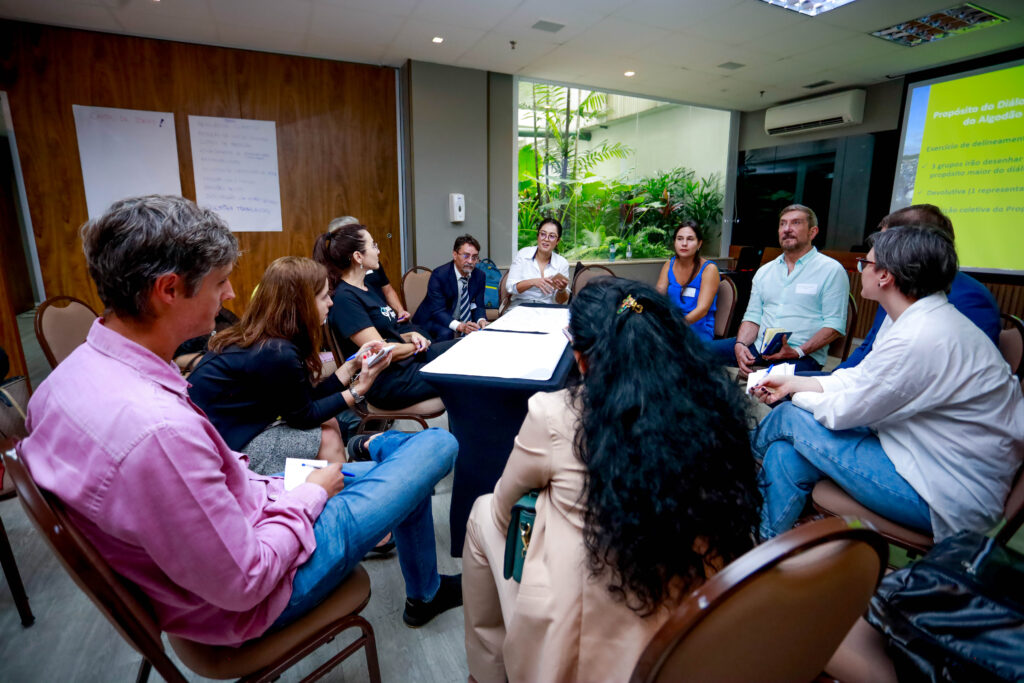

3 April, Brasília – Better Cotton, the world’s largest cotton sustainability initiative, has launched a new effort uniting key stakeholders across Brazil’s agricultural and textile sectors to build an ambitious vision for more sustainable cotton production.
The inaugural Multistakeholder Dialogue, held in Brasília on 26 March, brought together representatives from cotton producers and exporters, textile associations, retailers, brands, civil society, researchers, government agencies, financial institutions, and NGOs.
Together, participants identified climate resilience, traceability, and greater collaboration as priority areas to shape future actions, help define best practices and tackle systemic agricultural challenges.
Lena Staafgård, COO at Better Cotton, said: “Brazil’s agricultural industry is vast and is not only a leading producer and exporter of cotton, but of many other commodities. By bringing together key stakeholders across Brazil, we create a platform to overcome mutual challenges and champion best practices. Together, I’m confident we can accelerate change, and I look forward to future meetings.”
Better Cotton has worked in Brazil’s cotton sector for more than a decade in collaboration with its Strategic Partner ABRAPA, the country’s association of cotton producers. Márcio Antonio Portocarrero, Executive Director at ABRAPA, said: “I see dialogue as a way for us to build a coalition of ideas and solutions together with diverse sectors that often tend to isolate themselves and think differently. This can only lead to progress and improvement.”
As cotton is grown in rotation with other crops, closer collaboration across sectors is essential to addressing shared challenges and driving best practice adoption.
This initiative offers Brazilian cotton growers a platform for stronger engagement with industry stakeholders, to gain insights into their work and perceived risks, and for increased innovations to address sector-wide challenges.
Kamila Garantizado, Sustainability Specialist at Brazilian clothing department store Lojas Renner, noted: “This was a highly educational environment, with very active listening. It became very clear that the needs [of others] are relatively similar to ours—like improving communication.”
Participants committed to continuing their collaboration and will reconvene in the coming months to drive further progress towards a more sustainable cotton production in Brazil.
Notes to Editors:
- For interview requests, please contact Chris Remington ([email protected])
Additional information and context:
- Better Cotton’s new Multistakeholder Dialogue in Brazil has gathered representatives of different agricultural areas, plus retailers and NGOs, around the continuous efforts to increase the sustainability of the country’s cotton production.
- This collaborative action will involve regular discussions and the identification of common objectives towards more sustainable activities, providing invaluable exchanges and useful new channels of communication not only within the cotton industry, but also alongside other agricultural sectors and their producers in Brazil.
- The presence of representatives of the Brazilian government also showed a significant level of local support to this multistakeholder dialogue.
Additional quotes from attendees:
- Álvaro Moreira, Better Cotton’s Senior Manager: Large Farm Programmes and Partnerships, said: “The multisectoral dialogue allows us to embrace multiple perspectives on the activity of each of us in the cotton chain, helping us overcome challenges in a more efficient, transparent, and collective way.”
- Silvio Moraes, Senior Engagement Manager at Textile Exchange in Latin America, said: “It was a very important moment. I commend Better Cotton for bringing together this entire chain, so many different stakeholders. I think this is something we’re sorely missing in Brazil: showcasing best practices and integrating the chain to help these practices spread further.”
- Thaianne Resende Henriques Fábio, Director of Brazil’s Environmental Quality at the Ministry of Environment and Climate Change, said: “This will promote collaboration and cooperation among the different segments of the production chain. Here we’re including the private sector, government, and associations – ensuring the continuity of sustainable and innovative practices.”







































